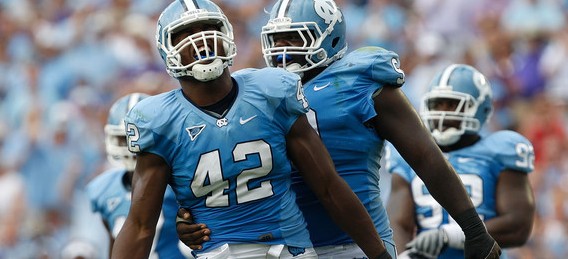 Over the weekend, Dan Kane of NewsObserver.com wrote an article that largely focuses on agent Carl Carey Jr. teaching a class at the University of North Carolina-Chapel Hill. Carl Carey is the agent who filed a lawsuit against former University of North Carolina and current St. Louis Rams defensive end Robert Quinn, Quinn’s Business Manager, Impact Sports Football, LLC, and two of Impact Sports’ agents for allegedly interfering with Carey’s contractual relationship, which supposedly led to Quinn terminating his relationship with Carey mere days prior to the conclusion of the NFL lockout. He is suing Quinn over roughly $300,000 in loans and advances that were given to Quinn prior to the termination of their agency contract.
Over the weekend, Dan Kane of NewsObserver.com wrote an article that largely focuses on agent Carl Carey Jr. teaching a class at the University of North Carolina-Chapel Hill. Carl Carey is the agent who filed a lawsuit against former University of North Carolina and current St. Louis Rams defensive end Robert Quinn, Quinn’s Business Manager, Impact Sports Football, LLC, and two of Impact Sports’ agents for allegedly interfering with Carey’s contractual relationship, which supposedly led to Quinn terminating his relationship with Carey mere days prior to the conclusion of the NFL lockout. He is suing Quinn over roughly $300,000 in loans and advances that were given to Quinn prior to the termination of their agency contract.
Kane’s article presents an interesting conflict of interest question to consider: Is it a conflict of interest for a sports agent to teach a class at a university where a current client formerly attended? Further, is it a conflict for that agent to be recruiting student-athletes at the university where he is a professor? As many of you already know, I will begin teaching a class at Indiana University Bloomington (via webcam from my office in Fort Lauderdale, Florida) tonight. My situation is different than Carey’s. I do not currently represent any athletes who attended IU Bloomington in the past. I also have not filed a lawsuit against any of my former clients who attended the university that I am about to start teaching at. But what if I happen to represent former IU Bloomington athletes in the future?
On the surface, IU Bloomington does not have the same agent problems that occur at UNC, so it is certainly less of a concern that IU Bloomington has hired me to teach at the university. Further, I do not currently represent any former IU Bloomington athletes.
Kane writes,
Carey’s return to campus was a problem for UNC’s athletic department, which quickly alerted its academic advisers to not recommend his class. John Blanchard, a senior associate athletic director, said the department did not know Carey had been hired until after the fact.
Is that type of action necessary? As Kane’s article states, Carey had the credentials and experience to teach the class that was offered. Should it matter that Carey was represented a player from that university that he provided large loans to and then sued for the return of that money?
Carey stated,
“I was there because of my love for teaching students. I was not there for any other purpose but to teach the class.”
I see nothing wrong with his hire, but I am inherently biased, as I will begin teaching at an institution of higher education tonight for the same exact reason presented by Carey. What say you?

2 replies on “Ethical Considerations Of Sports Agent Teaching College Course”
I think it’s perfectly fine as long as the line is not crossed. Maybe an annual report sent to whoever is the regulatory board with listing such as if anybody being recruited is a current student. If they are a student at same university it seems fine, but not if they are also a student in your class. Could bring suggestions of conflict of interest with grading.
For what it’s worth, I think the biggest issue is the APPEARANCE of a conflict, whether there is one or not (and the fact is no one knows what the future holds). It seems to me that the only ways to get around this are either to not teach the class or have a “no recruit” policy from that university.